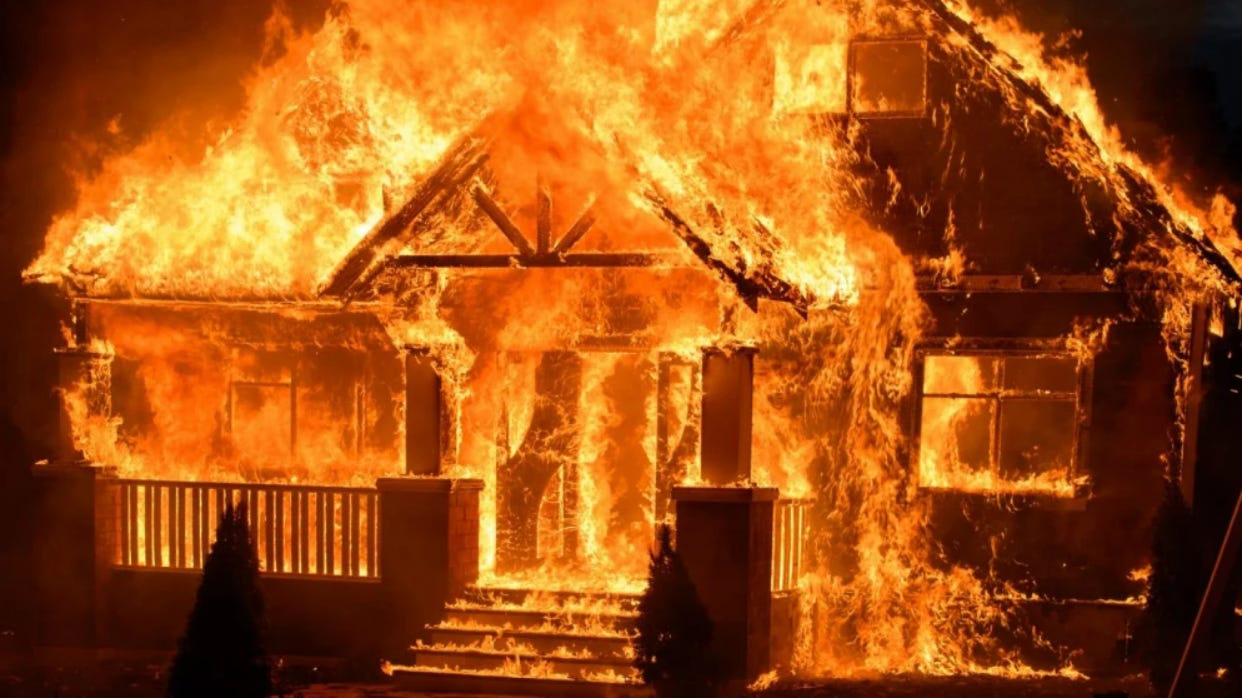Burning Down the House
Owning a home changed my life. Watching it gain value makes me feel sick.
Just One of My Moral Dilemmas
I have a confession to make.
I am a hypocrite.
I talk about witnessing and kindness and being motivated to action. Changing the system from the bottom up.
But sometimes my resolve weakens. Only for a moment, but it is there. I feel something, a burst of desire within me, that immediately fills me with shame. It is a lust most foul.
I shamefully, lustily, am overcome with something that after a moment’s indulgence I shove back down. But I am going to expose myself for you to see right now.
I get excited when I see the value of my house go up.
Whew… I said it out loud. Confession is a balm for the soul.
So What?!
But why is this a shameful feeling? Why does my internal architect keep that door locked and closed to visitors?
This is one of those situations where I am of competing thoughts. My parents never owned a home. We were always renters, and often not for long. In one fifteen month stretch my family lived in five different homes. And when they died, they left nothing but debt.
Owning a home was always a goal for me. And eventually I was able to buy one. Actually two, my ex-wife owns the first. But after five years of recovering from the financial hit of divorce, I was ready to buy again. 2021, just before interest rates began to rise and just in time to ride the post Covid hot housing market.
Depending on the measurement, the home my second wife and I bought increased 30% to 40% over the next two years. Great news, right?
Right?
Oh No, Your House Increased in Value. What a Shame.
For my net worth, yes. But not to prevent kids in Jacksonville from going through what I went through. Home affordability has only gotten worse since I was sleeping on the floor under a dining room table in the 1980’s.
The original version of this post had a whole bunch of paragraphs going deep into the way both renting and buying a home has become more difficult over the past several decades. I could easily get bogged down in an Ezra Klein style wonk walkthrough, but I am here to focus on the unresolved moral dilemma I am wrestling with. Links to all the supporting data are found below1.
For every increase in the value of my home it makes it harder for the kids who are fighting to climb from poverty to the middle class like I did. But my moral clarity gets complicated when I calculate my own fiscal reality.
But I know where I am financially. I may have a six-figure job (for now, I’m never confident in capitalism), but I had to start from $0 and climb through a mountain of student loan debt just to get to a positive net worth in my early 40’s (graduating in 2008 did me no favors either).
And I am forever haunted by a tossed off comment from my boss.
“If you don’t have $1,000,000 in retirement savings by 40, you’re going to work forever,” she said.
I was an investment center manager at the time. I saw people’s holdings, the funds they were living on in retirement. And I knew she was right.
Working in finance, I know how precarious my middle-class lifestyle is while I am trying to build my own personal safety net. A round of layoffs, a medical crisis, a natural disaster that my insurance company decides isn’t covered, just the tip of the iceberg of the ways the randomness could undo it all.
I know precisely how far behind I am.
And that my home is my largest asset.
Everything has a moral weight. Every thought contributes to the person we are building. My desire for my home to increase in value comes at a cost to the people trying to follow the path I did.
I want to see a better world, but that instinct to hunch over my small pile of wealth and snarl at any threat? That is real.
And I’m not alone. So much of the world we live in makes us distrustful of others, seeing them as threats to what we have, what we deserve.
If you are here looking for the answers of how I reconciled my desire for more equitable world with my personal fear of collapsing back into poverty, I’m going to disappoint you.
I didn’t start writing about how I’m trying to be decent in a world on fire to brag about how I’ve got it all figured out, and now I’m a perfect person. I have constant moral failings. And I always will. You can’t be a perfect person in an imperfect world.
Until this confession, no one knew about how I wrestle with this particular moral dilemma. Most people I know probably wouldn’t even see an issue.
Who doesn’t want to see their investment increase in value?
But what is the value of the self I am building if it hides a room filled with my evil of indifference?
It’s a room that I can hide and lock the door. Or I can open the door, throw up the blinds, and let light shine on my failure. It’s not some play for martyrdom. Woe is me in my middle-class guilt.
No, the lesson here is what I am doing about it.
We all have these thoughts we think are harmless.
No one sees them. They don’t change policy. They don’t shift markets. They’re just passing feelings, right?
But we’re not hidden from ourselves.
And the person we are building, the one who shows up at neighborhood meetings, or votes for school levies, or decides whether to speak or stay silent, that person is being shaped by those thoughts.
Every moral choice begins in a private moment.
And I’m trying to meet mine with the lights on.
If you're ready to explore practical philosophy for everyday ethical decisions, without the academic jargon, subscribe to Radical Kindness: Empathy as Rebellion. Every week, I share frameworks for navigating moral complexity, personal stories of growth through adversity, and tools for building a more ethical life. Join a growing number of thoughtful readers who are figuring out how to be good humans in a complicated world.
Sources & Further Reading
Joint Center for Housing Studies of Harvard University. Record Homelessness Amid Ongoing Affordability Crisis. April 2024.
Joint Center for Housing Studies of Harvard University. Home Price-to-Income Ratio Reaches Record High. July 2023.
Federal Reserve Bank of St. Louis. Median Sales Price of Houses Sold for the United States (MSPUS). FRED Economic Data.
SCEPA – The New School. 401(k) Plans: A Failed Experiment. Schwartz Center for Economic Policy Analysis, 2016.
Pew Charitable Trusts. How Housing Costs Drive Levels of Homelessness. August 22, 2023.
Washington University Law Review. Corporate Consolidation of Rental Housing: The Case for National Rent Stabilization. December 27, 2023.
Washington Post. In Montana, YIMBYs Are Beating NIMBYs. June 9, 2022.
So much data… I really like data. Those house spent pouring through data from the Fed was not regretted.




